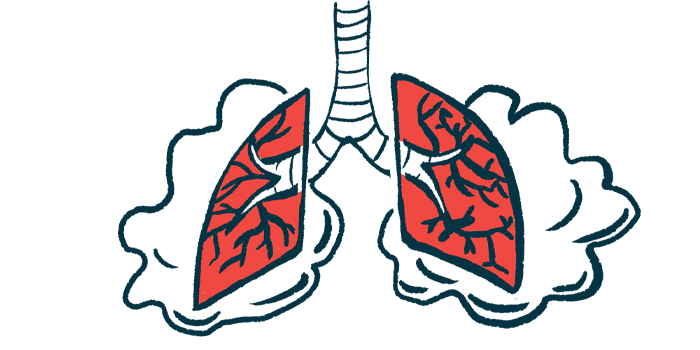Inhaled AP01 likely more effective, safer than Esbriet, Ofev
Slower loss of FVC, fewer side effects with experimental formulation
Written by |

Treatment with AP01, Avalyn Pharma‘s experimental inhaled formulation of pirfenidone, appears to be slightly more effective for idiopathic pulmonary fibrosis (IPF) than the oral version, which is sold as Esbriet, and results in fewer side effects.
AP01’s efficacy and safety profiles with progressive forms of pulmonary fibrosis (PPF) also appeared to be better than those reported for oral Ofev (nintedanib), the only approved therapy for this patient subgroup.
That’s according to analyses of data from the Phase 1b ATLAS clinical trial (ACTRN12618001838202) and its open-label extension study AP01-005 (EudraCT 2020-005103-39), when compared with results from studies of Esbriet and Ofev.
The findings were discussed in presentations at the European Respiratory Society (ERS) International Congress 2023 in Milan, Sept. 9-13.
“The consistent trend toward stabilization of lung function across the ATLAS and AP01-005 studies indicate to us that AP01 is reaching the lungs with sufficient concentrations and is having the intended effect in participants with both idiopathic and progressive forms of pulmonary fibrosis,” Howard M. Lazarus, MD, Avalyn’s chief medical officer, said in a company press release. “These efficacy results, combined with the continued strong tolerability profile across patient populations support our continued clinical development of AP01 in adults with pulmonary fibrosis.”
Avalyn plans to launch a Phase 2 trial of AP01 in PPF patients, with recruitment projected to start early next year. Additional clinical development steps are expected in the coming months.
Pirfenidone is PF standard of care for IPF
Pirfenidone works to slow the progression of lung scarring (fibrosis), the hallmark characteristic of pulmonary fibrosis. Oral formulations of it, including Roche‘s Esbriet and its generics, are considered standard of care for IPF, the most common form of PF.
The medications have also been shown to benefit people with PPF, that is, lung fibrosis of known or unknown reasons other than IPF that progressively worsens over time. They aren’t approved for this indication, however.
Esbriet and its generics are associated with side effects, though, particularly with the gastrointestinal system, that may be intolerable or dose-limiting for some patients.
How does AP01 work?
AP01 is delivered directly to the lungs as a soft mist via a nebulizer. This mode of delivery enables lower doses to be used and is thought to lower the risk of side effects associated with whole-body exposure.
ATLAS enrolled 91 adults with IPF who were intolerant to or ineligible for Esbriet or Ofev.
The participants were assigned to either one of two doses — 50 mg once daily or 100 mg twice daily. After about six months, all of those still in the trial were transitioned to the higher dose until week 72 (about 1.5 years).
Most patients treated with the higher dose had stable lung function at six months and at one year of treatment, interim data showed.
Of the 55 participants who completed ATLAS, 41 enrolled in the AP01-005 extension study, wherein all are receiving the high dose for a longer period. An added 31 IPF patients and 28 with PPF who hadn’t participated in any AP01 trial were also enrolled.
Slower FVC reductions, fewer side effects with AP01
In the oral presentation “Nebulized Pirfenidone in idiopathic pulmonary fibrosis (IPF): first look at FVC data,” Alex West, MD, an ATLAS investigator at Guy’s and St Thomas’ National Health Service Foundation Trust, London, discussed nearly one-year results from the 72 IPF participants in the AP01-005 study.
AP01 resulted in a less profound reduction in Forced Vital Capacity (FVC), a measure of lung function, than previously reported with Esbriet, reflecting a slower decline in lung function.
In a poster presentation, titled “Nebulized pirfenidone in non-idiopathic pulmonary fibrosis (IPF) progressive pulmonary fibrosis (PPF): first look at FVC data,” West discussed the findings from the 28 PPF participants in the extension study, who had a mean age of 63.8.
Consistent with the findings in the IPF group, AP01-treated PPF patients saw a slower FVC decline over nearly a year of treatment than was reported for those given Ofev.
For both IPF and PPF patients, AP01 was associated with lower rates of certain side effects, namely nausea, rash, diarrhea, indigestion, and vomiting, relative to the known side effect profile of Esbriet and Ofev. A mild cough was the most commonly reported side effect among participants inboth studies.
In the poster, “Forced vital capacity (FVC) data from the ATLAS study vs placebo from 3 historical idiopathic pulmonary fibrosis (IPF) randomized controlled trials (RCTs),” Nazia Chaudhuri, MD, an ATLAS/AP01-005 trial investigator and a consultant in respiratory medicine at Ulster University School of Medicine in Ireland, shared the findings of a comparative analysis between FVC data from IPF patients in ATLAS and pooled FVC results from placebo groups of four previous IPF trials of Esbriet or Ofev.
Compared with the placebo groups of the Phase 3 ASCEND trial (NCT01366209) of Esbriet and the Phase 3 INPULSIS-1 (NCT01335464), INPULSIS-2 (NCT01335477), and INBUILD (NCT02999178) trials of Ofev, a high dose of AP01 was associated with a significantly slower FVC decline.
The lower AP01 dose had effects comparable to a placebo, further supporting the higher dose’s superiority.
“The results support the continued clinical development of nebulized AP01 in fibrotic lung diseases,” the scientists wrote.







